Small Business VAT Registration Threshold Explained
Everything you need to know about the VAT registration threshold after April 2024.
Key Highlights
According to company law, enterprises incorporated in the UK have a statutory requirement to file the following information, most of which is made available to the public through the Companies House register —
Companies House is the official registrar of companies responsible for —
Read also: Changes to Companies House: Fee Increase Effective 1 May 2024 & More
The search service is the primary means users use to access the data in the register. Its advanced search function is vital for those seeking to explore the UK business landscape beyond individual company details.
By leveraging this function, users can also comprehensively understand the dynamics of their chosen industry, identify market trends, assess competition, and make informed strategic decisions.
It is an online database of all Companies House-incorporated companies in the UK. It provides access to crucial details like business names, registration numbers, registration dates, statutory office addresses, directors’ details, shareholders’ information, financial statements, and filing histories.
These available details make it an indispensable tool for individuals, entrepreneurs, investors, and businesses, facilitating informed decisions, market analysis, due diligence, and regulatory compliance assessments.
Additional Insights: Changes to UK company law on registered office address.
Subscribe to our newsletter and join the ranks of 100,000+ entrepreneurs who receive weekly insights, legal updates, and compliance reminders directly in their inbox.
The search service is a public tool that provides free company data to consumers, businesses, or any other party seeking to explore and surface information about a company.
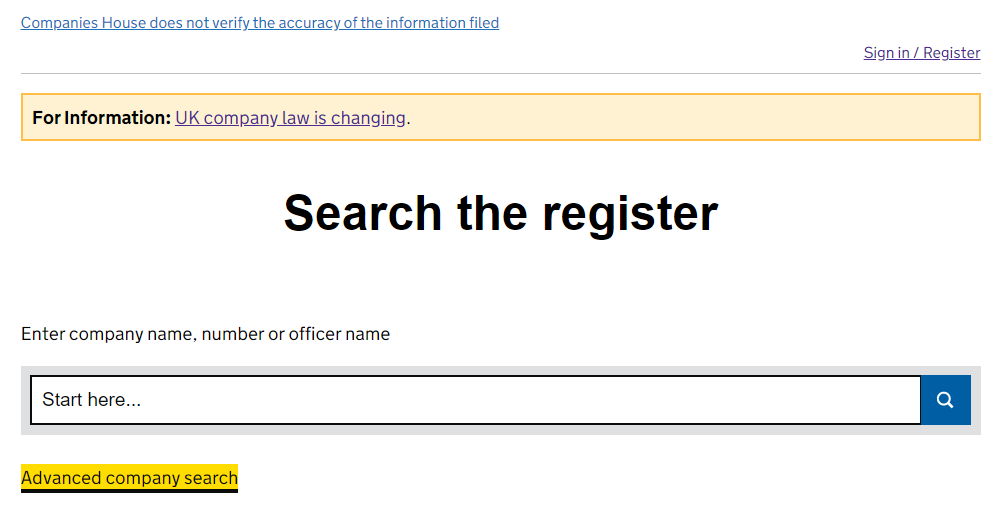
The Companies House register search bar
To use the service, —
You do not need to sign up with your email address and password to review primary company data.
Insight
The Companies House WebCheck and the Companies House Direct were discontinued on 30 November 2023.
Information available via the register —
You will not find personal information like the company authentication code for online filing. Further, as a matter of safety, companies are discouraged from using home addresses as the official company or director service address since this info will be available publicly.
The advanced search function is a feature of the find and update company information service designed for individuals or entities looking to uncover trends or comprehensive systematic information about the UK business landscape.
Available through
https://find-and-update.company-information.service.gov.uk/advanced-search.
You can use the function for the following purposes —
You can use the name search functions to surface nuanced information about company naming trends in the UK.
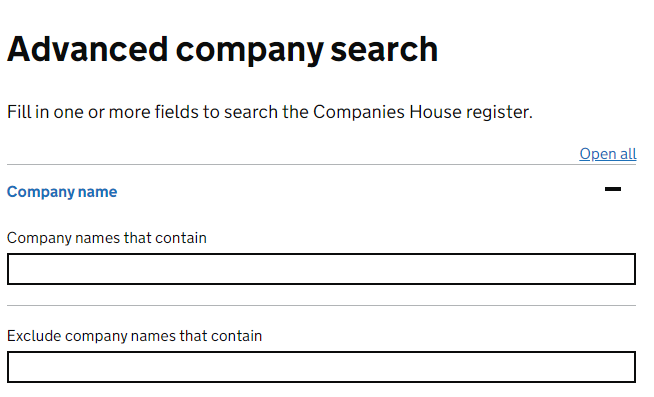
Advanced company name search
The first parameter is the ‘names that contain’ search field. Here, you’ll be able to enter a keyword or phrase related to business names.
For example, when researching technology companies, you can start by searching the keyword ‘Tech’ in this field. The results will populate all the companies with names containing the word ‘Tech,’ such as ‘Global Tech Solutions’ or ‘London Tech Services’ (not real names). They will also include an overview with details such as status, legal structure, registration number, address, and SIC code.
The ‘exclude company names that contain’ search field filters out specific names or terms from the search results. For instance, if you enter ‘services’ in this field, the search results will exclude companies with names containing the word ‘services.’
These parameters help users refine their search criteria to find companies that meet their specific requirements or exclude those irrelevant to their search.
Insight
If you remember part of a company’s name, such as ‘Consulting,’ enter it to find relevant matches like ‘ABC Consulting Services’ or ‘XYZ Consulting Group.’ These results provide an overview, including details such as status, legal structure, registration number, address, and SIC code to help you identify a desired company of interest. Additionally, you can refine your search by excluding specific terms using the ‘exclude company names that contain’ field, aiding in finding precisely what you need.
Furthermore, you can use the address service to search for companies within a specific address range. Whether you have the complete or partial address, this feature allows you to identify businesses registered at a particular location.
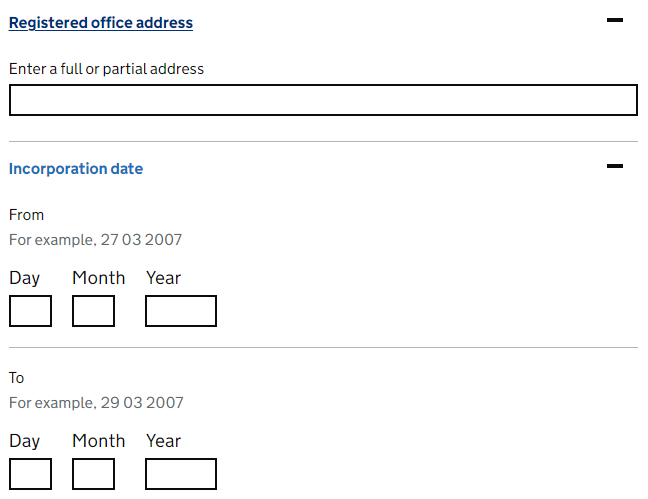
Search by registered office address and incorporation date
This feature can be handy when assessing the level of competition within a specific area or region.
The incorporation date search feature enables users to retrieve information about companies registered within a specific timeframe. For instance, by specifying a date range, you can pinpoint the number of companies registered during that period. Using these insights, you get a sense of the stability of businesses within the industry and broader economic trends.
You can also examine the industries of newly incorporated companies over a selected timeframe, uncover emerging sectors, gauge market trends, and identify areas of growth or decline within the economy.
See also: Exploring the Implications of Business Survival Rates.
You can search by company status. Filter parameters encompass a range of statuses, including active, dissolved, open, closed, converted closed, receivership, liquidation, administration, insolvency proceedings, and voluntary arrangement.
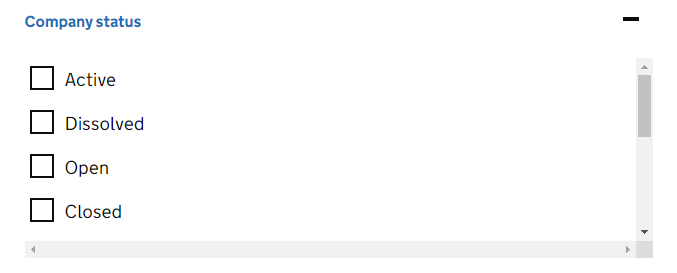
Search by company status
The status filter provides invaluable insights, especially to individuals seeking to establish a UK company or seeking information about the following—
The ‘Nature of Business’ search parameter enables users to filter companies based on their Standard Industrial Classification (SIC) code, providing insights into the specific industries or sectors they operate in.
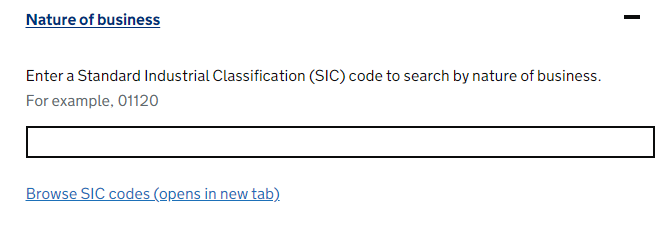
Search by nature of business (SIC code)
By entering a relevant SIC code, such as “01120,” for agricultural production, users can narrow down their search results to companies in the sector.
Stakeholders can use this functionality for market analysis, competitor research, and identifying potential business opportunities within targeted industries.
These parameters encompass various company types and subtypes with unique characteristics and legal frameworks.
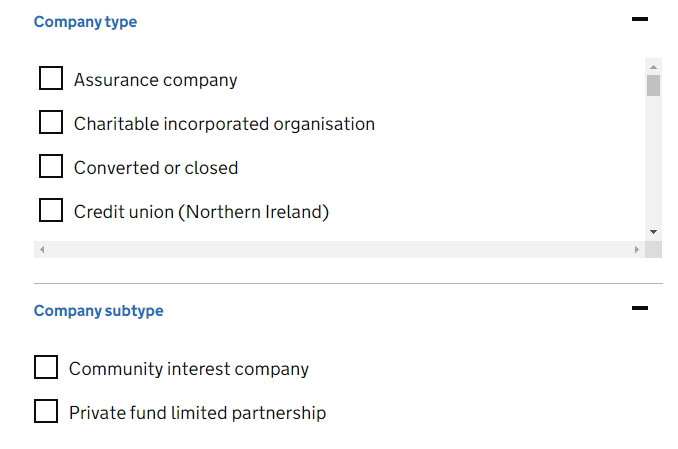
Search by Company Type and Company Subtype
By leveraging this search functionality, users can tailor their search queries to specific categories, allowing for comprehensive analyses of trends such as the number of businesses registered under a particular regime, lifespan, survival rates, and industry distribution based on SIC codes and other relevant details.
For example, users can target specific company types like “Limited Liability Partnership” or “Public Limited Company,” enabling them to gain insights into the operational structures and regulatory obligations of entities falling under these classifications.
Furthermore, users can explore subtypes such as “Community Interest Company” or “Private Fund Limited Partnership,” highlighting companies with specialised missions or operating models. A nuanced exploration allows users to identify businesses aligned with specific objectives or interests, enhancing the relevance and precision of their search results.
Searching by winding-up date allows users to track and analyse the history of companies that have ceased operations within a specified timeframe.
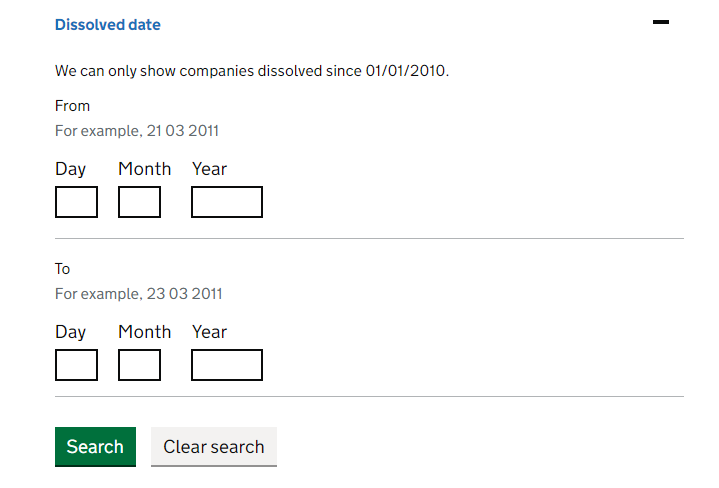
Search by dissolved date
The functionality enables users to —
Insight
Users can gain granular insights into the UK business environment by independently exploring parameters or trends in business names, addresses, incorporation dates, status, nature of business, company type, subtype, and dissolved date.
However, its value emerges when these search functions are combined, allowing users to perform sophisticated analyses tailored to their needs.
For example, let’s say a user is an investor or founder seeking to understand the UK tech industry. They can refine their search by, for instance, using the keyword “tech” to find technology companies (using the company name search), operating within a specific location (using the address search), incorporated within a particular timeframe (using the incorporation date search), with active status (using the company status search), engaged in software development (using the nature of business search), structured as a limited liability partnership (using the company type search), and examine their dissolution patterns over time (using the dissolved date search).
Such a holistic approach will enable users to surface comprehensive and actionable insights, supporting various applications such as market research, due diligence, risk assessment, and regulatory compliance.
Once you’ve surfaced the information about a business of interest, if you select the ‘More’ tab, you’ll find that you can get certified copies of the company details.
Find out more: GOV.UK One Login Programme Explained!
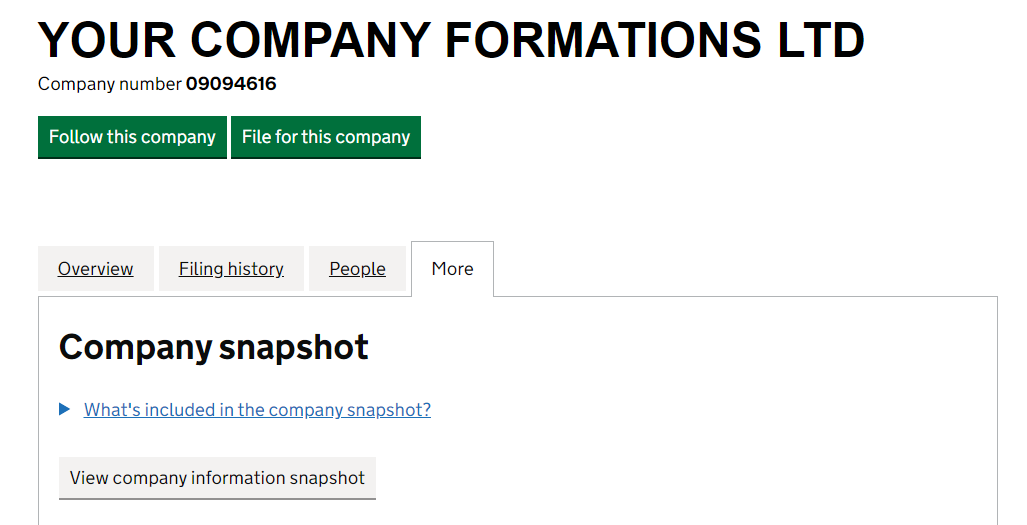
Company Snapshot
You can order a certified copy of a document in a company’s filing history. To make the order, you’ll need to sign in to or create a Companies House account and have a debit or credit card with you.
Orders for registration documents consist of the certificate of incorporation and all other documents issued or filed when the company was formed.
The fee for the standard dispatch —
The fee for the express dispatch —
Interested parties can order a company’s certified certificate of incorporation, along with —
The fee for the above order includes —
To track a company using the search service, set up free email alerts for updates on filings. Receive notifications whenever the company submits a document, ensuring you stay informed about its activities and status.
As the official registrar of companies in the UK, you can get information on all companies registered in England, Wales, Scotland, and Northern Ireland. The types of business on the service include —
However, the UK search service will not surface information on entities with the following prefixes because such data is excluded from the register —
Further, companies with the following prefixes are not obliged to register any documents —
Find out more: What is a limited company?
The service enables stakeholders in the UK to make informed decisions and confidently engage in business. Its main benefits include —
Fast Fact
From Monday, 4 March 2024, Companies House has new and enhanced powers to improve the quality and reliability of its data and tackle misuse of the companies register. Such powers include the right to query information submitted by companies and request supporting documentation. Subscribers of UK companies must submit an undertaking that they are creating the company for lawful and not fraudulent activities.
Though the service provides invaluable information on registered companies, it has the following limitations —
Yes. Companies submit form IN01 alongside their articles and memorandum of association during registration; these documents are publicly available on the register. The memorandum of association is a legal statement that includes the names of the founding members and their intention to incorporate the company for lawful purposes, while the articles of association outline how the company will be owned and formally managed.
See Also: Company Formations Checklist
Businesses can use the service to support their operations, make informed business decisions, and gain valuable insights into industry trends and performance. Specific ways to use the service include —
Yes. Suppose you’re thinking of working with another company or using their services. In that case, you can perform a search free of charge using a business name and access valuable information. You do not need an account for basic company information, but if you wish to follow the company, you’ll need to register and receive regular updates about its operations and activities.
Once you submit your personal information to the Registrar during formation, it is challenging to have them remove it. However, you can buy a director’s address from Your Company Formations for your correspondence and company address in the public register.
If you believe having your details on the register poses a safety and security risk. In that case, you can contact Companies House customer service at 0303 1234 500 (Monday to Friday, 8:30 am to 6 pm) and apply to have them removed or restricted through the following link: https://www.gov.uk/stop-companies-house-from-publishing-your-address.
No. Sole traders are not required to register with Companies House UK because they are not limited companies. A sole trader operates individually and is personally liable for their business. However, they must register with the HM Revenue and Customs (HRMC) for tax purposes.
The national archives are the UK government’s official archive and are responsible for preserving and providing public access to historical records and documents. Companies are responsible for registering UK companies and maintaining their information. The archives can be used to access government and public records, maps, and historical photographs. You may also find government records of a company’s registration and dissolution. The register contains the company’s information filed as required by the company’s registrar.
Warning
Once you submit your address as the director’s address to Companies House during registration, it may not be easy to have them remove it. However, you can buy a director’s service address from Your Company Formations and use it as your address in the public register.
Webfiling, a company portal from Companies House, streamlines the submission of company data, whereas the search service helps uncover filed information. A company authentication code is required for web filing; however, accessing basic company data through the search service doesn’t require credentials. However, a Companies House account is necessary for in-depth company details.
Exceptional blog and great design and style.
Thank you for reading and sharing!